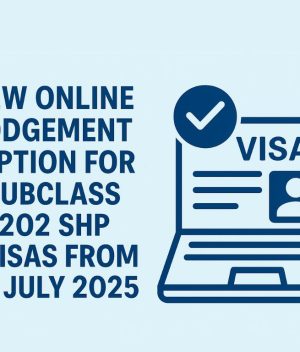Understanding Workplace Rights for Visa Holders in Australia: A Guide for Migrants and Employers
Australia offers a vibrant job market, attracting thousands of skilled workers, students, and temporary visa holders each year. However, visa holders need to understand their workplace rights to avoid exploitation and ensure fair treatment. The Australian Government developed the Workplace Rights Guide to inform workers, including visa holders, about their legal protections and obligations.
Why Workplace Rights Matter for Visa Holders
Many visa holders may feel vulnerable due to their immigration status, making them more susceptible to exploitation by unscrupulous employers. However, it’s important to note that visa holders in Australia have the same workplace rights as Australian citizens. Understanding these rights helps ensure compliance with workplace laws and protects workers from unfair treatment.
Key Rights and Protections for Visa Holders
1) Equal Treatment and Fair Pay
- All workers in Australia, including those on temporary visas, are entitled to the minimum wage and employment conditions set out by the Fair Work Act 2009.
- Employers cannot underpay or withhold wages based on a worker’s visa status.
2) Protection from Unfair Dismissal
- Visa holders are protected from unfair dismissal if they have worked for their employer for the minimum qualifying period.
- Unfair dismissal claims can be lodged with the Fair Work Commission (FWC) for resolution.
3) Freedom from Discrimination and Harassment
- It is illegal for employers to discriminate against workers based on their nationality, race, visa status, or any other protected attribute.
- Workers have the right to a safe and inclusive work environment.
4) Protection from Workplace Exploitation
- Workers facing exploitation, including underpayment, unsafe work conditions, or forced labor, can report the issue to the Fair Work Ombudsman (FWO) or seek assistance from legal aid services or unions.
New Protections for Visa Holders: Strengthening Reporting Protections Pilot
The Australian Government has introduced the Strengthening Reporting Protections Pilot, which offers new protections for visa holders who experience exploitation in the workplace. This initiative ensures that:
- Visa holders who report exploitation will not face visa cancellation or adverse immigration consequences due to a breach of work-related visa conditions.
- The new laws encourage visa holders to report exploitation without fear of jeopardizing their visa status.
Recognizing Signs of Workplace Exploitation
Visa holders should remain vigilant and report any signs of exploitation, including:
✅ Wage Underpayments: Receiving less than the minimum wage or missing entitlements like overtime or penalty rates.
✅ Unsafe Working Conditions: Working in environments that pose a risk to physical or mental health.
✅ Coercion or Threats: Being forced to work under threat of deportation or harm.
✅ Lack of Proper Documentation: Working without proper employment records or contracts.
Understanding Visa Conditions and Employer Obligations
Some visa conditions restrict the type of work and the number of hours a visa holder can work. However:
- Employers cannot cancel a visa when a worker breaches visa conditions, especially in cases involving exploitation.
- Workers have the right to report any form of mistreatment without the risk of immediate visa cancellation.
Role of the Fair Work Ombudsman (FWO)
The Fair Work Ombudsman is the key authority that enforces workplace laws in Australia. Visa holders can contact the FWO to:
- Seek advice on workplace rights and entitlements.
- Report any form of exploitation or unfair treatment.
- Access free resources and information about workplace laws.
Why Migration Agents and Lawyers Should Share the Workplace Rights Guide
The Workplace Rights Guide is an essential resource for Registered Migration Agents (RMAs) and migration lawyers to educate and protect visa holders. While not mandatory, RMAs and migration lawyers should provide this guide to clients to ensure they understand their rights and obligations.
✅ Future Compliance: The Department of Home Affairs is conducting a review that may make distributing the guide mandatory for RMAs.
✅ Translated Versions Coming Soon: The guide will soon be available in multiple languages on the Office of the Migration Agents Registration Authority (OMARA) website to ensure accessibility for all workers.
Preventing Workplace Exploitation: Steps for Visa Holders
- Know Your Rights: Familiarize yourself with the Fair Work Act and visa conditions that apply to your visa subclass.
- Keep Employment Records: Maintain copies of employment contracts, payslips, and communication with employers.
- Report Exploitation Promptly: Contact the Fair Work Ombudsman or seek legal advice if you suspect any form of exploitation.
- Seek Support: Legal aid services and unions offer support and guidance for workers who experience unfair treatment.
Conclusion: Empowering Visa Holders with Knowledge and Resources
Understanding workplace rights is critical for visa holders to protect themselves from exploitation and ensure fair treatment in Australia. The Workplace Rights Guide serves as a comprehensive resource for both workers and migration professionals to uphold the principles of fairness, equality, and compliance with Australian workplace laws. As awareness grows and protections strengthen, visa holders gain confidence to report workplace exploitation and seek justice.
✅ Emigrate Lawyers ensures visa holders stay informed and protected. If you or someone you know has experienced workplace exploitation, contact us today for expert legal assistance.
Source: workplace-rights-guide-publication.pdf and
Related Content: For more information on workplace rights and visa holder protections, check out our guide on Understanding the Remote Working Visa 491.





